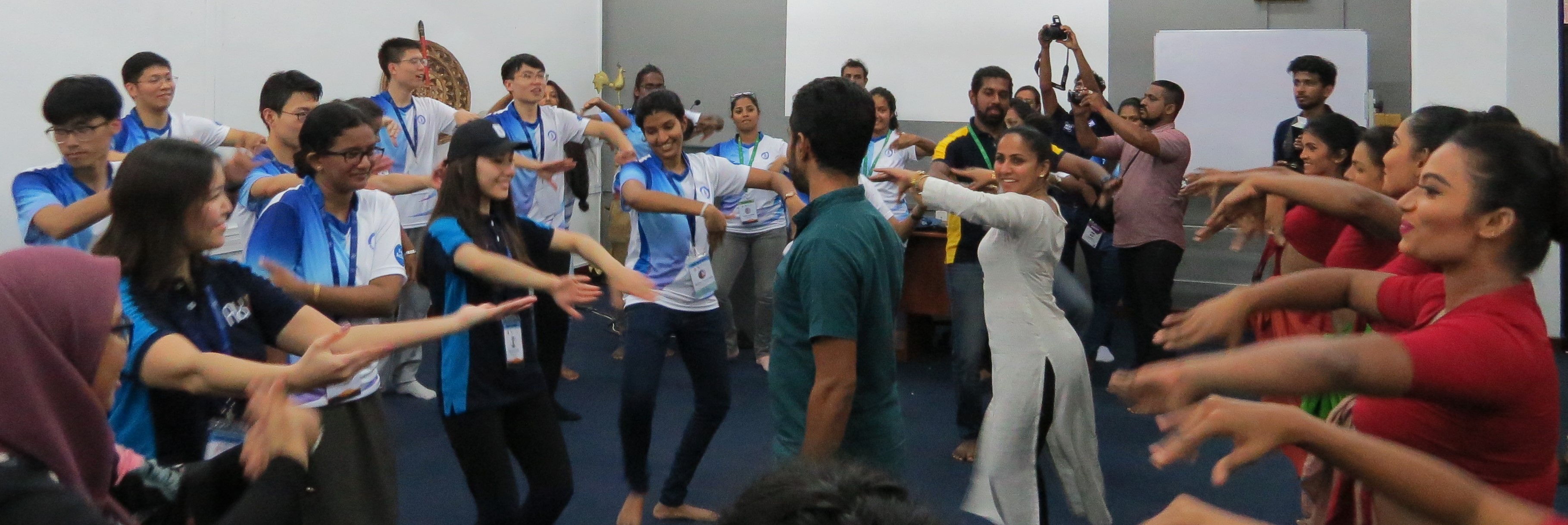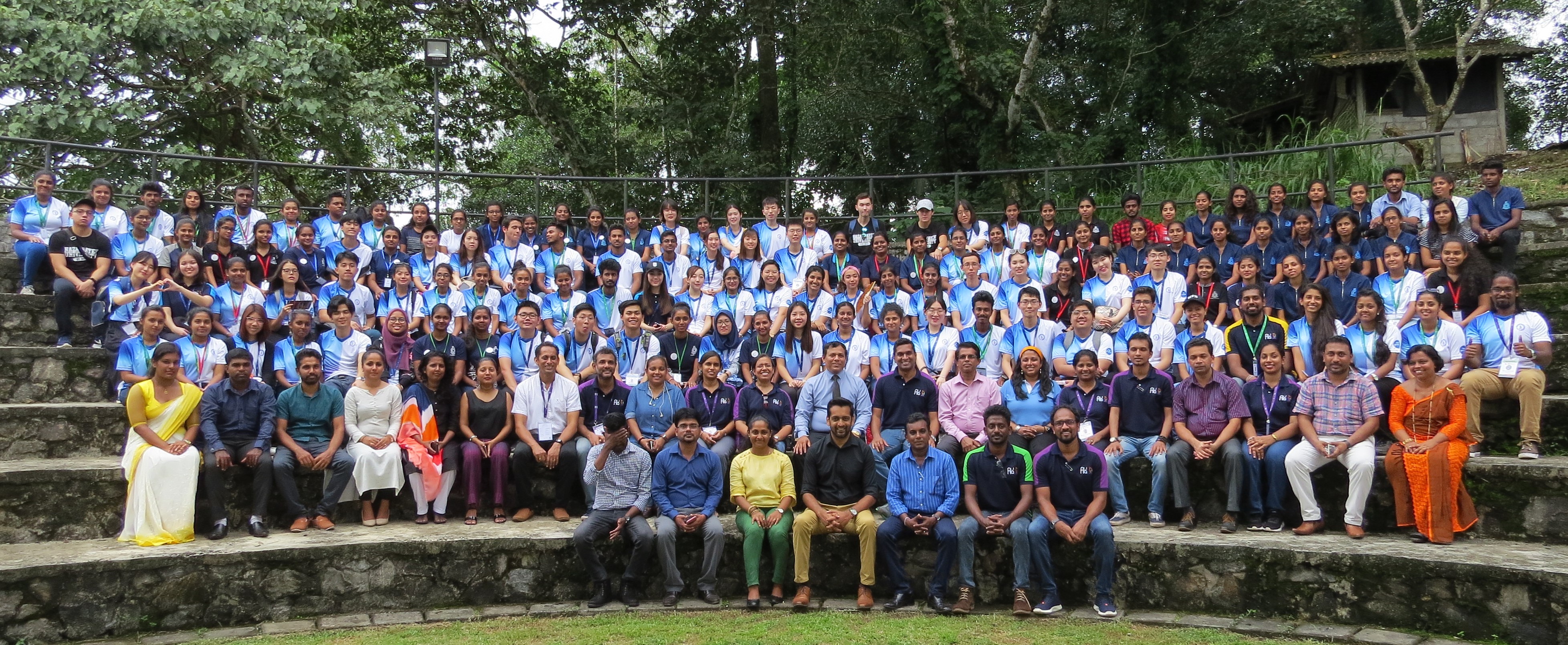25 – 29 November, 2019, Sri Lanka, The Asian Universities Alliance (AUA) is an academic alliance of the top universities in the Asian region. The University of Colombo received the Executive Presidency of the AUA for 2019-2020 and hosted the AUA Youth Forum from 25-29 November, 2019. The Youth Forum is an activity-based program for selected students from AUA member universities that addresses developmental issues in the region, enhances youth empowerment, and promotes cultural and academic exchange. A total of 44 students from 11 universities attended the Youth Forum. This year’s theme was “Wellbeing Beyond Health”, in alignment with the Sustainable Development Goal 3 (SDG) – Good Health and Wellbeing.

The Youth Forum began with an inauguration ceremony featuring a speech by the University of Colombo Senior Professor and Vice Chancellor, Chandrika Wijeyaratne, on the significance of the Youth Forum as a platform to create change-makers and young leaders. Dr Olivia Nieveras, WHO Sri Lanka Public Health Administrator, gave the keynote address on behalf of Dr Razia Pendse, WHO Sri Lanka Representative. Dr Nieveras spoke of the important role youth play in achieving the SDGs, stating that “the young people of today are the ‘SDG generation’ who will experience the success or failure of the 2030 Agenda. Therefore, it is particularly important to engage with and empower young people as we endeavor to create a more sustainable future”.
By definition, “sustainable development” is development that meets the needs of the present without compromising those of the future. Research shows that youth are remarkably effective in engaging their families in efforts to improve wellbeing. Therefore, young people are uniquely positioned to create positive change in communities.
Physical inactivity is a major contributor to noncommunicable diseases like heart disease and stroke. Conversely, physical activity has been associated with psychological benefits, such as a reduction of the symptoms associated with anxiety and depression. Similarly, physical activity can assist in the social development of young people by providing opportunities for self-expression, building self-confidence, and increasing social interaction and integration.
World Health Organization Sri Lanka partnered with the AUA Youth Forum, to ensure the forum empowered participants to incorporate physical activity into their lives. Promoting physical activity was a cross-cutting theme, with sessions of guided physical activity conducted daily.
One day of the Youth Forum was held at the Sri Palee Campus in Horana and focused on empowering youth to incorporate physical activity into their lives. The day was filled with engaging and active sessions, including a nature hike, tree-planting, traditional Sri Lankan dance lessons, drumming instructions, and a talent show.
The Youth Forum ended with participant presentations on ways to combat the most pressing issues of their generation, such as climate change and the need for mental health services. The presentations were innovative, creative, and inspiring. A panel of experts, including Vice Chancellor Wijeyaratne, Dr Chathuranga Ranasinghe, Chairperson of AUA Youth Forum, and Dr Padmal De Silva, WHO Sri Lanka National Professional Officer for Health Systems Policy and Evaluation, provided insight and advice on how to build upon and implement the presented ideas.

The AUA Youth Forum was an exciting program that brought together young leaders from across Asia. It provided participants with opportunities to learn about the importance of incorporating physical activity into their lives to achieve ‘Wellbeing Beyond Health’. WHO believes that the skills gained will be taken back to communities across Asia and that these young change-makers will begin to fulfill their role of creating a sustainable future.

The Youth Forum began with an inauguration ceremony featuring a speech by the University of Colombo Senior Professor and Vice Chancellor, Chandrika Wijeyaratne, on the significance of the Youth Forum as a platform to create change-makers and young leaders. Dr Olivia Nieveras, WHO Sri Lanka Public Health Administrator, gave the keynote address on behalf of Dr Razia Pendse, WHO Sri Lanka Representative. Dr Nieveras spoke of the important role youth play in achieving the SDGs, stating that “the young people of today are the ‘SDG generation’ who will experience the success or failure of the 2030 Agenda. Therefore, it is particularly important to engage with and empower young people as we endeavor to create a more sustainable future”.
By definition, “sustainable development” is development that meets the needs of the present without compromising those of the future. Research shows that youth are remarkably effective in engaging their families in efforts to improve wellbeing. Therefore, young people are uniquely positioned to create positive change in communities.
Physical inactivity is a major contributor to noncommunicable diseases like heart disease and stroke. Conversely, physical activity has been associated with psychological benefits, such as a reduction of the symptoms associated with anxiety and depression. Similarly, physical activity can assist in the social development of young people by providing opportunities for self-expression, building self-confidence, and increasing social interaction and integration.
World Health Organization Sri Lanka partnered with the AUA Youth Forum, to ensure the forum empowered participants to incorporate physical activity into their lives. Promoting physical activity was a cross-cutting theme, with sessions of guided physical activity conducted daily.
One day of the Youth Forum was held at the Sri Palee Campus in Horana and focused on empowering youth to incorporate physical activity into their lives. The day was filled with engaging and active sessions, including a nature hike, tree-planting, traditional Sri Lankan dance lessons, drumming instructions, and a talent show.
The Youth Forum ended with participant presentations on ways to combat the most pressing issues of their generation, such as climate change and the need for mental health services. The presentations were innovative, creative, and inspiring. A panel of experts, including Vice Chancellor Wijeyaratne, Dr Chathuranga Ranasinghe, Chairperson of AUA Youth Forum, and Dr Padmal De Silva, WHO Sri Lanka National Professional Officer for Health Systems Policy and Evaluation, provided insight and advice on how to build upon and implement the presented ideas.

The AUA Youth Forum was an exciting program that brought together young leaders from across Asia. It provided participants with opportunities to learn about the importance of incorporating physical activity into their lives to achieve ‘Wellbeing Beyond Health’. WHO believes that the skills gained will be taken back to communities across Asia and that these young change-makers will begin to fulfill their role of creating a sustainable future.
